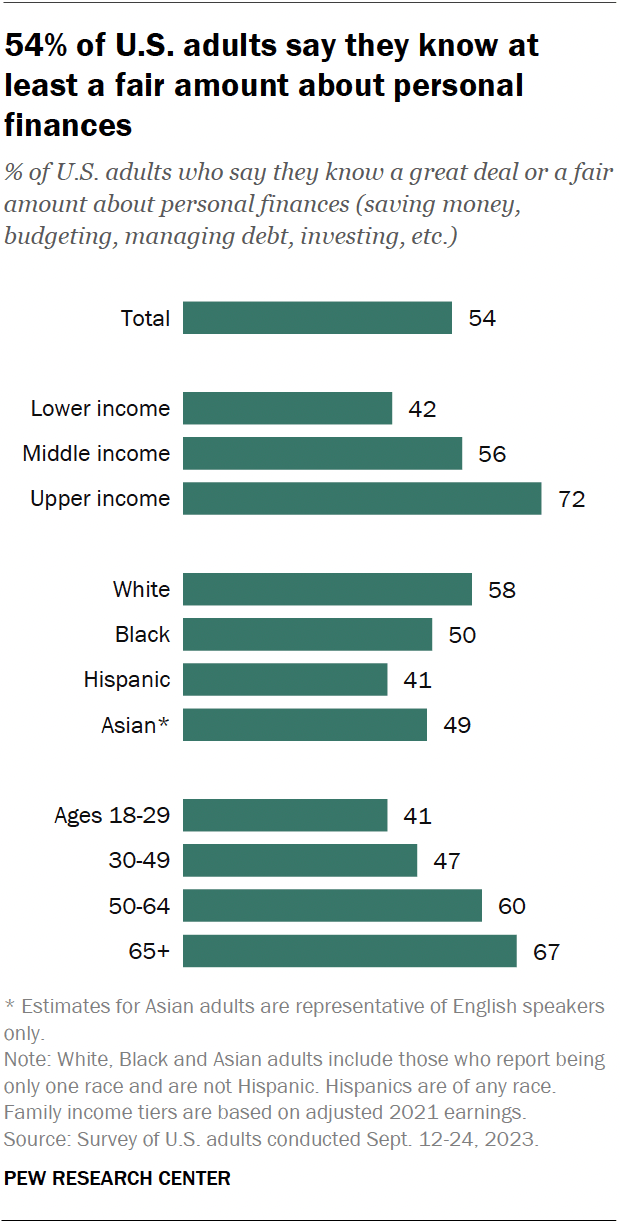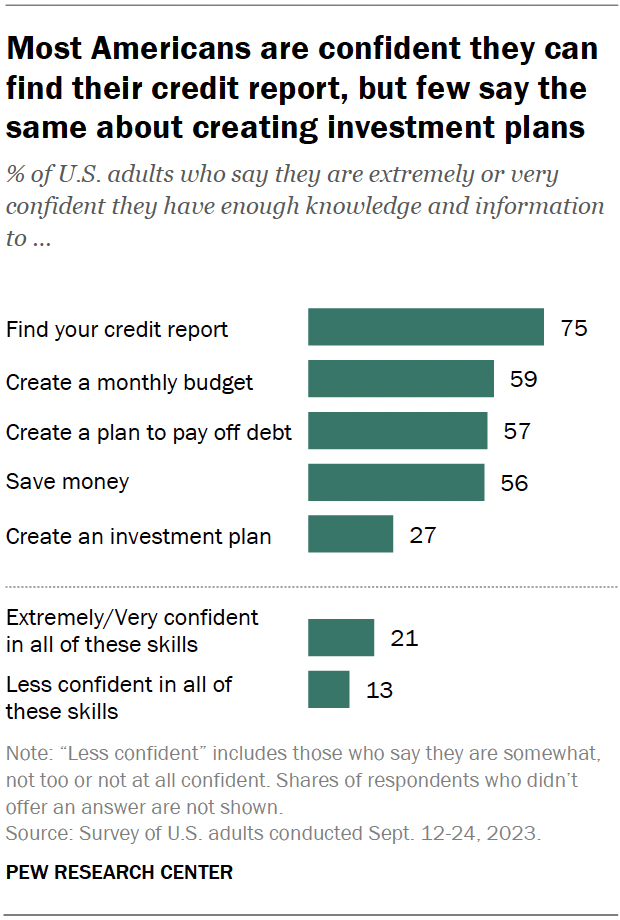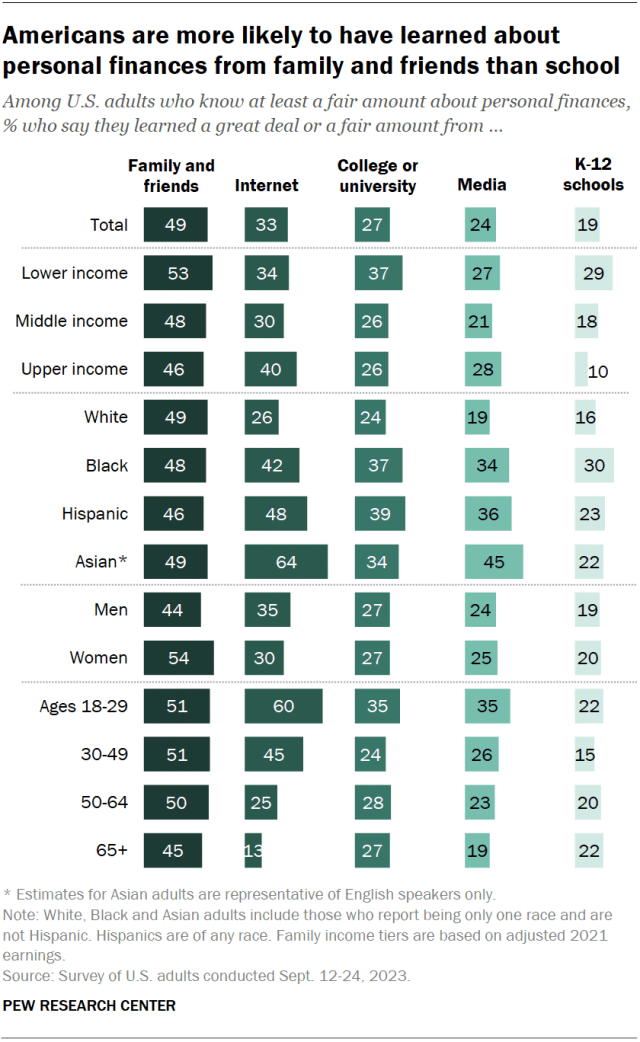
About half (54%) of U.S. adults say they know a great deal or a fair amount about personal finances. Another 33% say they know some about personal finances, while 13% say they don’t know much or know nothing at all, according to a 2023 Pew Research Center survey.
Knowledge about personal finances can refer to several strategies for managing money, including saving, budgeting, managing debt or investing.
This analysis draws on a 2023 Pew Research Center survey to examine how knowledgeable Americans feel about personal finances and their money management skills.
We surveyed 7,470 U.S. adults from Sept. 12 to 24, 2023, in English and Spanish. Some 2,734 White, Asian and Hispanic adults were surveyed on the Center’s American Trends Panel (ATP). In addition, an oversample of 4,736 Black adults were surveyed. The Black adult sample included those who identify as Black and non-Hispanic, multiracial Black and non-Hispanic, or Black and Hispanic. The oversample was made up of 1,755 Black adults from the ATP and 2,981 Black adults on Ipsos’ KnowledgePanel.
Respondents were recruited through national, random sampling of residential addresses. Recruiting panelists by mail ensures that nearly all U.S. adults have a chance of selection. This gives us confidence that any sample can represent the whole population. For more information on random sampling, refer to our Methods 101 explainer.
Read more about the questions used for this analysis and the survey methodology.

Financial literacy has been associated with greater financial well-being. There have long been economic gaps between Americans of different backgrounds, and our survey also finds gaps in financial literacy:
- Americans in households with upper incomes (72%) are more likely than those in households with middle (56%) or lower incomes (42%) to say they know at least a fair amount about personal finances.
- White adults (58%) are more likely than Black (50%) or Hispanic (41%) adults to say they know a great deal or fair amount. About half of Asian adults (49%) say the same. These differences by race remain regardless of income.
- Adults ages 50 and older (63%) are more likely than those 18 to 49 (45%) to say they are knowledgeable about personal finances.
On the other hand, about one-in-five Americans with lower incomes (22%) say they don’t know much or know nothing at all about personal finances. That’s a notably higher share than among those with upper incomes (4%). About a quarter of Hispanic adults (27%) say the same, higher than among Asian (17%), Black (14%) or White adults (8%).
Money management skills

U.S. adults have mixed confidence in their ability to perform various financial skills.
Most Americans (75%) say they are extremely or very confident in their ability to find their credit report. Smaller majorities say the same about creating a monthly budget to manage their finances (59%), creating a plan to pay off debt (57%) or saving money (56%).
By contrast, just 27% express confidence in their ability to create an investment plan to build wealth.
Americans’ confidence in these skills varies by income, race and age:
- U.S. adults with upper incomes are more likely than those with middle or lower incomes to say they are confident in their ability to do each of these things.
- White adults are more likely than Black, Hispanic or Asian adults to say they are confident they can find their credit report, create a monthly budget and create a plan to pay off debt.
- Adults ages 50 and older are more likely than those 18 to 49 to have confidence in their ability to do each task except create an investment plan. Across age groups, similarly small shares express confidence they can do that.
In addition, about one-in-five U.S. adults (21%) are confident in their ability to execute every financial skill we asked about. Americans with upper incomes (40%) are more likely to say this than those with middle (20%) or lower incomes (13%).
Meanwhile, 13% of Americans are not confident in their ability to do any of these money management skills. Hispanic (21%), Asian (21%) and Black adults (17%) are more likely than White adults (8%) to say this. And 22% of those with lower incomes say this, compared with fewer than 10% of those with middle or upper incomes (9% and 5% respectively).

Where do Americans learn about personal finances?

In recent years, more experts have called for greater financial education during high school to help students prepare for their futures. Relatively few Americans have learned about this in school, our survey finds.
Among U.S. adults who are knowledgeable about personal finances, 49% say they learned a great deal or a fair amount about personal finances from family and friends. That is the highest share for any source we asked about. About a third or fewer learned about personal finances from other sources such as:
- The internet (33%)
- College or university (27%)
- Media such as the news, documentaries or books (24%)
- K-12 schools (19%)
Learning about personal finances from family and friends is a relatively common experience across all major demographic subgroups. But there are notable differences for some other sources.
Internet
- Asian adults (64%) are more likely than Hispanic (48%), Black (42%) or White adults (26%) to say they learned a great deal or a fair amount about personal finances from the internet.
- Adults ages 18 to 49 are more likely than those 50 and older to have learned about personal finances from the internet (50% vs. 19%).
Media
- Asian (45%), Hispanic (36%) and Black adults (34%) are all more likely than White adults (19%) to have learned about personal finances from media.
- Younger adults are more likely than older adults to have learned about personal finances from media (29% vs. 21%).
K-12 schools
- Adults with lower incomes (29%) are more likely than those with middle (18%) or upper incomes (10%) to say they learned about personal finances from K-12 schools.
Note: Read more about the questions used for this analysis and the survey methodology.
